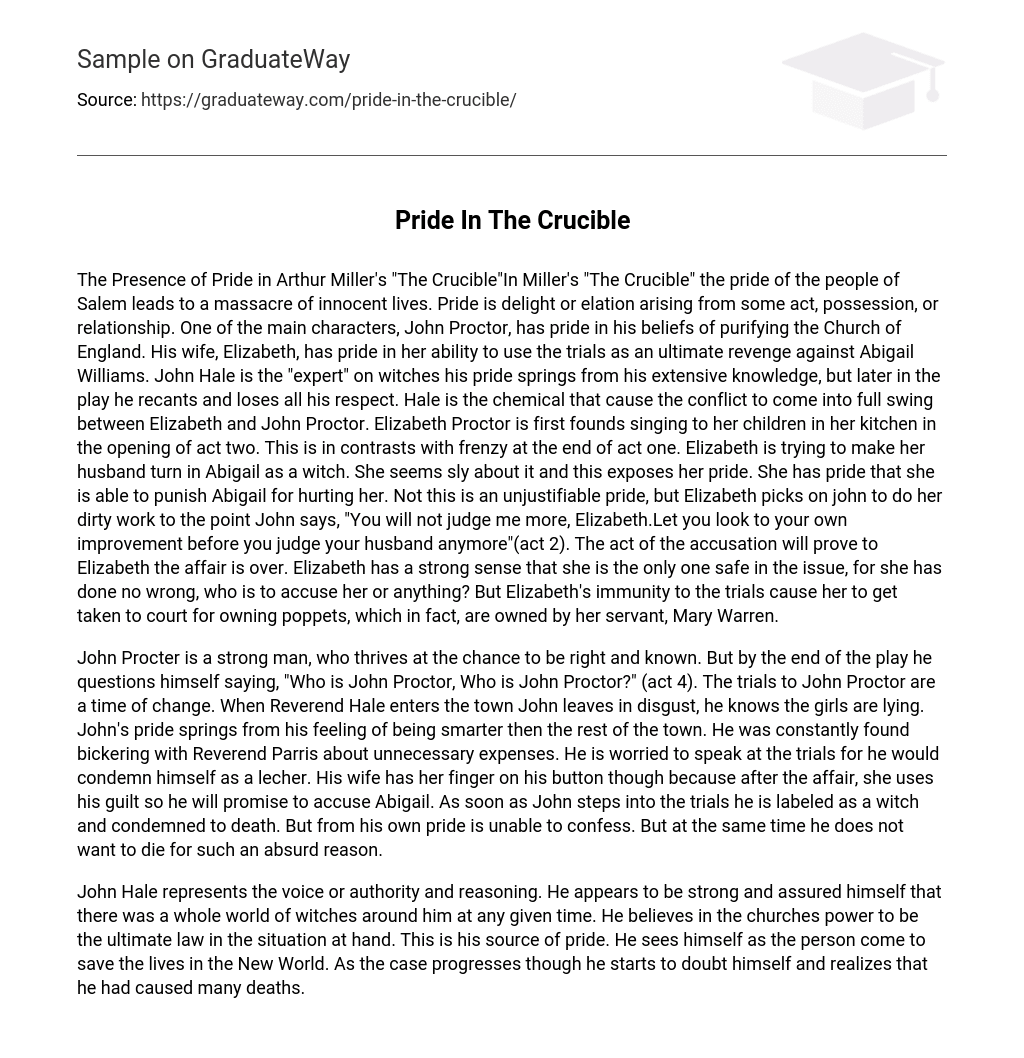In Miller’s “The Crucible,” the people of Salem’s pride ultimately leads to a massacre of innocent lives. Pride is defined as the feeling of delight or elation that arises from some act, possession, or relationship. John Proctor, one of the main characters, takes pride in his beliefs regarding purifying the Church of England. Meanwhile, Elizabeth, his wife, takes pride in her ability to use the trials as a means of gaining ultimate revenge against Abigail Williams. John Hale, considered an expert on witches, initially takes pride in his extensive knowledge. However, as the play progresses, he recants and loses all his respect. The presence of Hale serves as the catalyst for the conflict between Elizabeth and John Proctor to escalate fully.
Elizabeth Proctor is initially seen singing to her children in the kitchen at the beginning of act two, a stark contrast to the frenzy that occurred at the end of act one. She is attempting to manipulate her husband into denouncing Abigail as a witch, displaying a cunning demeanor that exposes her arrogance. Elizabeth takes pride in her ability to punish Abigail for hurting her, even though this pride is baseless. She directs John to do her bidding, to the extent that he tells her, “You will not judge me further, Elizabeth. Attend to your own improvement before passing judgment on your husband” (act 2).
The act of accusing Elizabeth will demonstrate the end of the affair. Elizabeth maintains her innocence and believes she cannot be accused. Nonetheless, she is brought to court due to her possession of poppets, which are actually owned by her servant, Mary Warren. John Proctor is a determined man who desires righteousness and recognition. However, he begins to doubt his own identity towards the play’s conclusion, pondering, “Who is John Proctor, Who is John Proctor?” (act 4).
The trials of John Proctor represent a period of transformation. Upon Reverend Hale’s arrival in town, John becomes disgusted and realizes the girls are lying. His pride arises from feeling intellectually superior to the rest of the community. He frequently argues with Reverend Parris over unnecessary expenses. Though afraid to testify at the trials, John knows doing so would expose him as an adulterer. His wife, however, manipulates his guilt to make him promise to accuse Abigail. Once John steps into the trials, he is instantly branded a witch and sentenced to death. Despite his pride, he struggles to confess his guilt. Yet, he equally does not want to perish for such a nonsensical reason.
John Hale personifies authority and reason, projecting strength and confidence in his unwavering belief that witches are constantly present around him. He places immense faith in the church’s power, regarding it as the ultimate governing force in the current circumstance. This conviction fills him with pride and shapes his perception of himself as a rescuer for those living in the New World. Nevertheless, as the case develops, uncertainty starts infiltrating his thoughts, making him realize that his actions have caused numerous fatalities. His once unshakeable pride quickly crumbles, compelling him to urge men and women to confess in order to save their own lives. “The Crucible” serves as a cautionary narrative illustrating how arrogance left unchecked can blind us and lead to our downfall.
By the end, the majority of characters managed to overcome their pride. Like the others, John Proctor’s redemption came too late to have a significant impact. However, his actions were warranted as he had become less self-centered and confessed to protect his family’s reputation. The events served as a purification process for all those involved, transforming them from their initial state of impurity to their true selves.





